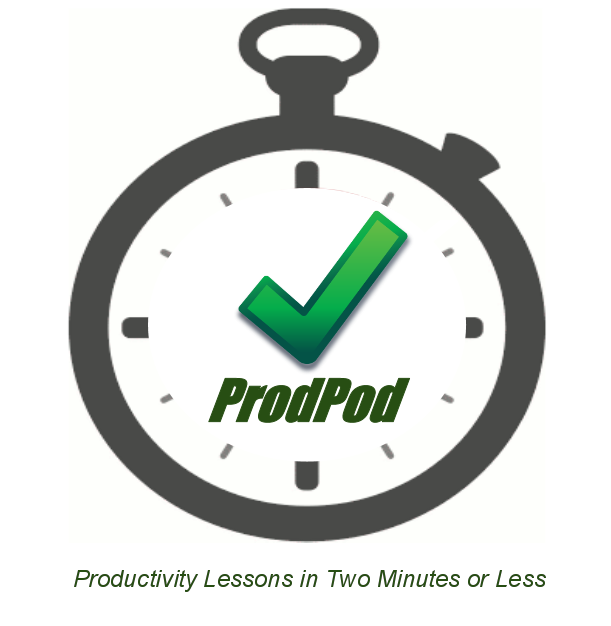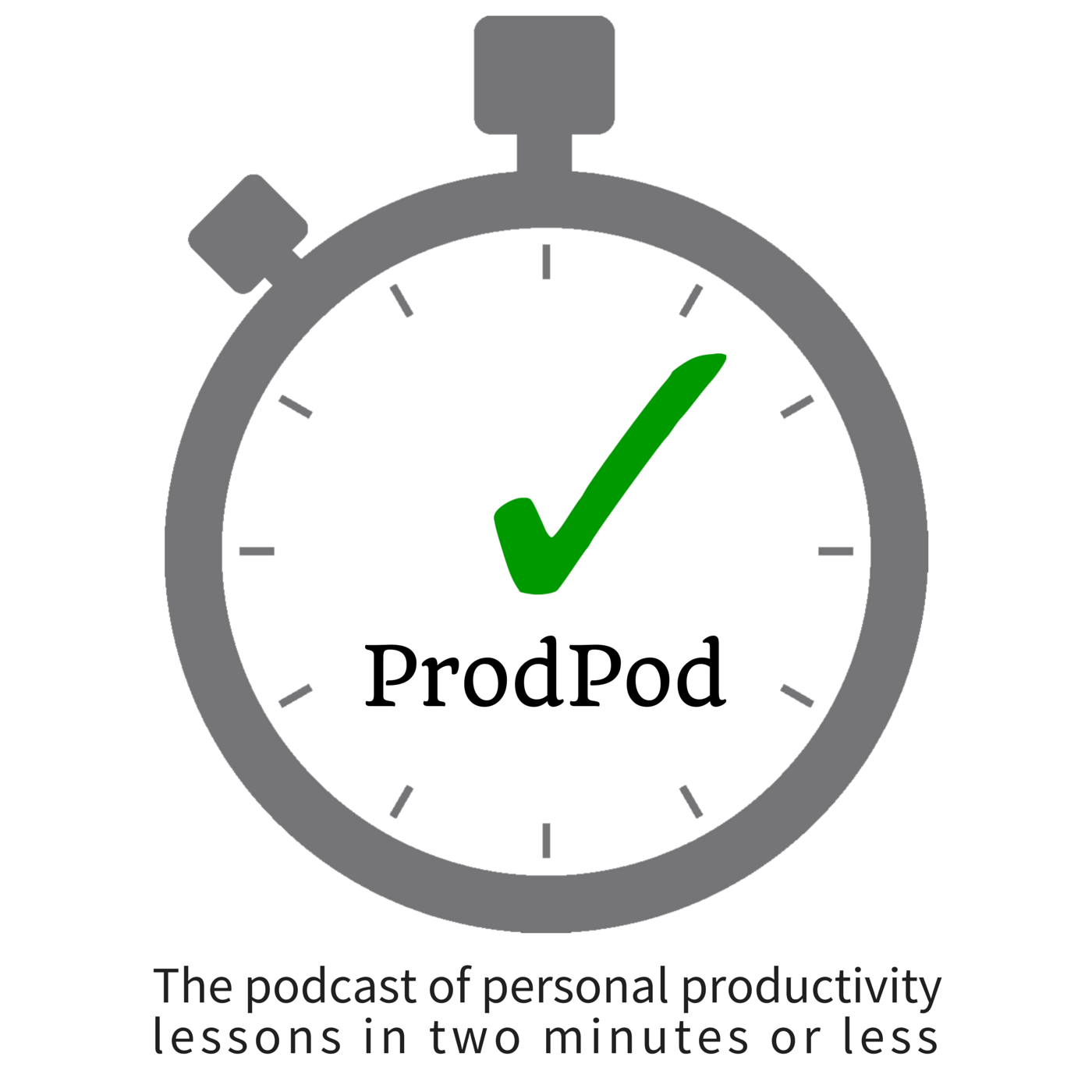Episodes

Thursday Sep 29, 2011
ProdPod: Episode 18 -- Someday or Maybe?
Thursday Sep 29, 2011
Thursday Sep 29, 2011
A "Someday/Maybe" list, according to David Allen's Getting Things Done (or GTD) methodology is for any goal, project or next action that you are not committed to achieving or doing right now. Many people have struggled to separate what goes on their Someday/Maybe lists from their Actions and Projects lists, so I thought in this episode I'd describe Someday/Maybe's in my productivity system in hopes that it helps others.
I distinguish between someday's and maybe's. Someday's I *will* do. Maybe's maybe not. For someday's I always put parenthetically after the description "Resources Needed/Wanted:" which asks the question: what would I need or want to happen that would trigger me to do this someday item right now? For me, this makes someday's realistic and available for when that "missing link" becomes available, whether that's time, money, emotional energy to invest, credentials, a new delegatee, a call from my mother, or so on.
So, in practical terms, I use two context lists to manage the various someday/maybe's in my life and work. This puts an intrinsic greater importance on somday's than on maybe's, so I typically review someday's every week during my Weekly Review. Whereas, my maybe's are items that I plan to review at least quarterly, but most of the time I come across the list monthly when I find the mental-emotional energy and time to think about my maybe's list. By its nature, they end up being somewhat of a wishlist of things I'd like to accomplish but haven't yet figured out how to accomplish, but with a little creativity I can make them a someday or perhaps even an actual project or next-action.
This is just one modification of many to GTD that I've implemented in my own personal productivity system, and it benefits me by allowing me to move stuff to definable goals without cluttering my active projects or next-actions lists with yet-to-be-productive items.

Tuesday Sep 06, 2011
Tuesday Sep 06, 2011
Two-Minute Book Summary: Who Moved My Cheese? An Amazing Way to Deal With Change in Your Work and in Your Life Dr. Spencer Johnson
Dr. Spencer Johnson wrote and published his NY-Times-5-years-running bestselling book, Who Moved My Cheese? An Amazing Way to Deal With Change in Your Work and in Your Life, in 1998. I read this oft-cited business fable back in 1999 or 2000 for the first time, and it represented a major change in my thinking about my life, and specifically my productivity. Dr. Johnson uses "cheese" to represent happiness and success, whereas I substituted his definition for my highly productive state called sometimes "flow."
The gem of the book arrives near the end of the book when one of the four characters, after facing the root of change avoidance: fear. He writes on a wall these words of wisdom...
Change Happens
They Keep Moving The Cheese
Anticipate Change
Get Ready For The Cheese To Move
Monitor Change
Smell The Cheese Often So You Know When It Is Getting Old
Adapt To Change Quickly
The Quicker You Let Go Of Old Cheese, The Sooner You Can Enjoy New Cheese
Change
Move With The Cheese
Enjoy Change!
Savor The Adventure And Enjoy The Taste Of New Cheese!
Be Ready To Change Quickly And Enjoy It Again
They Keep Moving The Cheese.
Final thoughts: Who Moved My Cheese is a great book and worth the read.

Tuesday Aug 30, 2011
ProdPod: Episode 16 -- To Change Productivity Systems, or Not?
Tuesday Aug 30, 2011
Tuesday Aug 30, 2011
In this episode's lesson, I explain why changing your entire productivity system can be truly counterproductive and to think twice.
I'm the first person to extol the virtues of change. I've actually got an episode upcoming about just how to handle change. But, when it comes to changing to an entirely new productivity system, in this episode's lesson, I explain why change on that macro level can be truly counterproductive and to think twice.
First, every productivity system is founded on habits and productive habits take time to develop. As I discussed in episodes 12 through 15, we have reason to believe habits take much more time to become evergreen than we've long-theorized. Take it consideration the time and effort to learn new productive habits in the context of a whole new productivity system.
Next, change is incremental and is based on what you already know. Your system may look completely different from five or more years ago, but it has your unique fingerprints all over it. No matter what system you adopt, it comes with the history of your past system and lessons learned from it. Analogously, Bruce Lee's martial arts methodology and life philosophy, Jeet Kune Do, took the best aspects of then-known martial arts systems and blended them, not to create a new system but to highlight the virtues of these established systems. His students were encouraged not to replace their systems, but to continuously learn lifelong about new styles. The same goes for you to continuously learn and grow from understanding your productivity methodology and values as well as unproductive obstacles, such as procrastination, evaluation deficits, and even avoiding true progress by adopting new systems.
Finally, too much change too quickly will present a level of chaos that's unproductive not only in the short-term but it trains you to become used to long-term disorder. Also, it's not sustainable to throw away any system completely as dramatic changes in critical habits usually lead to a dramatic return to the most unproductive habits in lieu of said change. Productivity overhauls have a ripple effect in an interconnected society, so expect that chaos to affect others in your work and personal life.

Thursday Aug 25, 2011
ProdPod: Episode 15 -- How to Form a Productive Habit, Part 4
Thursday Aug 25, 2011
Thursday Aug 25, 2011
Learning a Productive Habit This is the fourth and final episode in How to Form a Productive Habit. In episode 14, we discussed theory and now we'll be discussing a practical strategy and tactics for coming out victorious in your endeavor to form a productive habit.
First and foremost, always beta-test your new productive habit with a balanced perspective (not a critical one)...if you think of this as trial-and-error you'll be motivated longer to build the productive habit.
Second, Do more of the activities that develop the productive habit while conditioning yourself at the very end of habit development, so that when you feel ready to move to your normal habit schedule you're actually just slowing down not having to ramp up.
Small, phases/milestones with no real end goal...definitive goals are a habit killer; adjust for habituation; and, reward good habits (extrinsic motivation helps). Visualize yourself doing the new habit, but also think about the emotional fulfillment you'll feel when you practice the new habit.

Tuesday Aug 23, 2011
ProdPod: Episode 14 -- How to Form a Productive Habit, Part 3
Tuesday Aug 23, 2011
Tuesday Aug 23, 2011
Realities of Forming Habits: New Scientific Data This is part three of our 4-part podcast on How to Form a Productive Habit. In this episode, we'll be discussing the realities of forming habits using the most current scientific data on automaticity.
This is part three of our 4-part podcast on How to Form a Productive Habit. In this episode, we'll be discussing the realities of forming habits using the most current scientific data on automaticity.
About a year ago, the research associate in Health Psychology, Dr. Phillippa Lally, at University College London DEPARTMENT OF EPIDEMIOLOGY AND PUBLIC HEALTH in the
HEALTH BEHAVIOUR RESEARCH CENTRE performed a study on habit formation systematically as they reach automaticity.
The findings are quite interesting, albeit there are some constructive criticisms of the work. Here are the four main outcomes of the study and how it may help us with forming productive habits.
1. Automaticity took on average 66 days to be reached. Yes, 66 days. Banish the old concept of doing something repetitively for 21-30 days as once was thought.
2. Each person varies for similar habits. In the study, we found that the times ranged from 18 to 254 days to reach maximum automaticity. There are many variables why this may be the case: trying to learn too many new habits at once, not enough focus, time and/or attention, or other not-so-easily distinguishable idiosyncrasies. Ergo, don't think about reaching automaticity so much as the work of forming the habit. It'll reduce burnout.
3. Complex behaviors take more time. This may seem obvious but our previous understanding contradicts this. Don't beat yourself up so much about not building a productive habit of exercising regularly; it turns out that it may take significantly longer to reach that automatic state.
4. Counter to the great psychologist William James's theory, you can actually omit a behavior (say, miss a day at the gym) and it will have negligible effect on automaticity and long-term impact. However, there was some evidence that the effects of omitting the behavior was cumulative and so it's not a ticket to slack off, otherwise you won't be able to build that productive habit.
So, there you go. The real deal, theoretically, about forming habits from the latest in psychological understanding. Please join us for episode 15, our final part of How to Form a Productive Habit, where I'll be covering practical aspects of learning productive habits.

